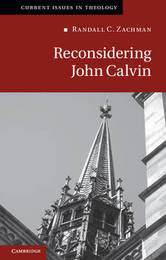
|
Reconsidering John Calvin
Paperback / softback
Main Details
| Title |
Reconsidering John Calvin
|
| Authors and Contributors |
By (author) Randall C. Zachman
|
| Series | Current Issues in Theology |
|---|
| Physical Properties |
| Format:Paperback / softback | | Pages:220 | | Dimensions(mm): Height 215,Width 138 |
|
| Category/Genre | Christian theology |
|---|
| ISBN/Barcode |
9781107601772
|
| Classifications | Dewey:230.842 |
|---|
| Audience | | Postgraduate, Research & Scholarly | |
|---|
| Illustrations |
Worked examples or Exercises
|
|
Publishing Details |
| Publisher |
Cambridge University Press
|
| Imprint |
Cambridge University Press
|
| Publication Date |
22 December 2011 |
| Publication Country |
United Kingdom
|
Description
Randall C. Zachman places Calvin in conversation with theologians such as Pascal, Kierkegaard, Ezra the Scribe, Julian of Norwich and Karl Barth, and attends to themes in Calvin's theology which are often overlooked. Zachman draws out Calvin's use of astronomy and great concern to see ourselves in comparison to the immensity of the universe, acknowledging in wonder and awe our nothingness before God. Throughout, Zachman presents a Calvin who seeks a route out of self-deception to self-knowledge, though Kierkegaard shows that it is love, and not judgment, that most deeply reveals us to ourselves. The book discusses Calvin's understanding of the election of the Jews and their relationship to God, and further reconsiders Calvin's understanding of judgment and how the call to love our neighbour is undermined by the formation of alliances.
Author Biography
Randall C. Zachman is Professor of Reformation Studies at the University of Notre Dame. He is the author of Image and Word in the Theology of John Calvin (2007), John Calvin as Teacher, Pastor, and Theologian (2006) and The Assurance of Faith: Conscience in the Theology of Martin Luther and John Calvin (2005). He is also the editor of John Calvin and Roman Catholicism: Critique and Engagement, Then and Now (2008) and, with Howard P. Louthan, of Conciliation and Confession: The Struggle for Unity in the Age of Reform, 1415-1648 (2004).
|